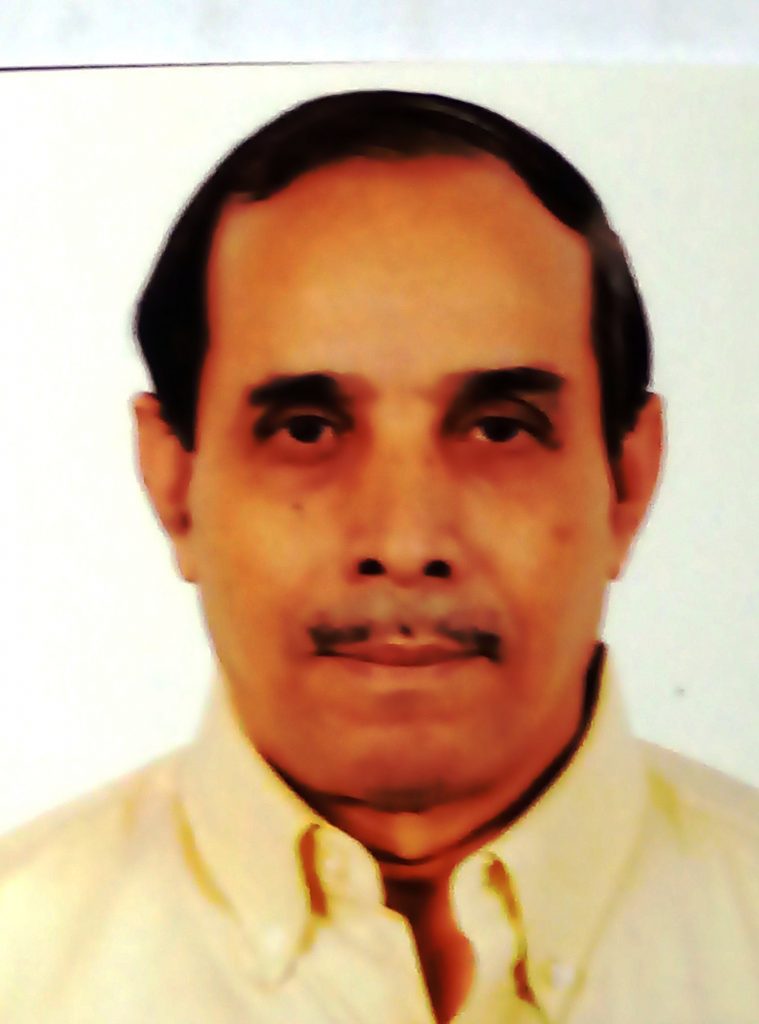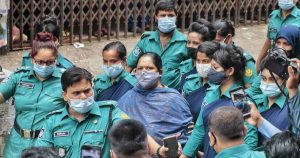Mostafa Kamal Majumder
As The New Nation became more or less self-reliant and I could respond to demands of working journalists to improve their working conditions in the paper with a mission to make it sustainable I got a phone call one day from President Iajuddin Ahmed to join him over a cup of tea, several months after the Army-backed Caretaker Government of Fakhruddin Ahmed take over of 11 January 2007. I received no such call from Bangabhaban before. I thought the President might have some important thing to discuss with me. There were changes in the civil administration of the President’s House. The secretary to the President was changed. Some other subordinate officers were on way to have new postings. Clearly this was done to change the set-up that the immediate past BNP government had organized for the President because the new caretaker government instead of concentrating on holding elections within 90 days sought two years’ time under a state of emergency it declared.
As I went to honour the invitation of the President at Bangabhaban, I was led directly to his office room. Soon Secretary Sirajul Islam, Additional Secretary Nasimul Ghani and Military Secretary to the President Major General … came to the room. In their presence, President Iajuddin Ahmed offered me the job of Press Secretary. I had no mental preparation to accept such a job more so because the president’s office was relegated to insignificance even though theoretically everything was done and enacted in the name and under the authority of the President. The all-powerful generals who installed the caretaker government drew their legitimacy from the signature of the President who was elected in the Parliament. A titular president under the Bangladesh Constitution became theoretically an all-powerful head of state after the resignation of the elected government. But in practice, his powers were exercised by the Chief Adviser with backing from Chief of the Army Staff Lt. Gen Moeen U Ahmed and other generals. Powerless yet President Iajuddin Ahmed was the Head of the State. It would not be nice to say no on his face. Etiquette demands that I speak without displeasing him. I said, Sir, My office is at a stone-throwing distance from Bangabhaban. You can call me for whatever work you want me to do. Your immediate past Press Adviser was junior to me. It would be unbecoming for me to accept a position lower in status. The president said the press adviser did manage to get the status for himself. ‘I have no objection if you can manage the same for yourself.’
The first meeting with the President ended inconclusively. In the second meeting Secretary, Sirajul Islam was nice enough to tell me that they were prepared to plead for one stage higher status for me as Press Secretary. But what I was talking about was a status higher than even the secretary’s. I maintained talking terms with the President, his Secretary and Military Secretary. I knew I will not join there to serve a powerless President. I talked to a mid-ranking political leader and an activist both of whom were in favour of my accepting the offer because this would add to my curriculum vitae. But I remained firm in my resolve.
The proprietor of NN was then an influential Adviser to the Caretaker Government. When he got the info about the offer he sought to know over the phone as to whether I was joining Bangabhaban as the Press Secretary to the President. I told him, I have the offer but I will not accept that. He uttered, ‘how you can if I don’t agree to release you’. Editor of The News Today Reazuddin Ahmed asked me to accept or reject the offer because in case of my rejection he can propose the name of a man who was the DG External Publicity at the Foreign Office but was jobless at the time.
After some time the President’s Secretariat appointed another man as Press Secretary. I was on Bangabhaban’s invitation list for more than 20 years and had the opportunity to meet President Iazuddin Ahmed. After the failure to make me his Press Secretary, the President used to call me for tea at his residence at intervals. He told me of his helplessness that letters addressed to him from outside did not reach him in time nor his letters went out of Bangabhaban in time. I asked why he does not take up these things with the Secretary. Instead, President Iajuddin Ahmed requested me to convey this to his military secretary.
One day the president told me he was bored to spend his idle time at the Bangabhaban. I told him why he doesn’t write his autobiography. This interested him. He told me of some ground breaking researches he had done at the University of Dhaka on the application of granular fertilizer which was more effective. I said this would be a good theme to begin with. I had a copy of a book – ‘Paradise drowning’ by President Maumoon Abdul Gayoom of the Maldives. He wanted to see the book. I took the book to him in the next meeting. The president said he would get a photocopy and return me the original, but somehow I did not get the book back. I said he can make use of his personal staff in the Bangabhaban to get his book done from his dictation. He took this up with his secretariat officials and the outcome was a large volume of the speeches he delivered on different occasions after becoming President in 2002. He served for seven years till 2009 when Awami League’s elected President Zillur Rahman took over. The content of the book was nowhere near the ideas we deliberated on. It was an official document of the Bangabhaban. Prof. Iajuddin Ahmed personally handed over his book to me and requested me to do a write-up on that.
At the President’s residential quarters I was received occasionally by his military ADC. On most occasions, his civilian staff used to lead me to his drawing room. I used to be well-received at the main gate. I marked a difference when I went to Bangabhaban to for the last tea with the president at his residence in November 2008. Security people at the main gate took more time than it normally required to allow my car in. One man came to know about the purpose of my visit. I said just the president’s call to have tea with him. As my car reached the entrance of the residential building of the President an army colonel in sporting dress received and took me to a nearby room and again sought to know the purpose of my visit. I repeated what I said at the main gate. The colonel said, ‘in that case you have to talk to the general, meaning the military secretary to the President. A new military secretary had taken over by then. I nodded. From the other end of the telephone the general said they have a lot of work to prepare the President for the Armed Forces Day function and it was difficult to make time for a long meeting. I said it was up to the president I did not have any personal agenda. The general said you should finish within 30 minutes. This last meeting was shocking to me. President Iajuddin Ahmed appeared to me to be different. His memory was failing. He was also a broken man. I finished the programme within 30 minutes and sped to my office in the NN because I did not foresee the wastage of time that I had to incur to reach Prof, Iajuddin Ahmed in my penultimate visit to him. I met him for the last time when the Awami League government took over and the President invited all media people to join his last press meet conducted by Information Minister Abul Kalam Azad.




